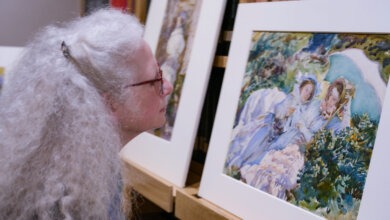Writer: Lucy Kirkwood
Director: James Macdonald
One could be simplistic and describe Lucy Kirkwood’s The Welkin, the new play by the writer of Chimerica and Mosquitoes, as a cross between The Crucible and an all-female Twelve Angry Men.
There’s an element of truth to that, to be sure: the bulk of the play is formed of an 18th century “court of matrons”, twelve local women who must decide if convicted murderer Sally (Ria Zmitrowicz) is pregnant. If she is not, she will hang; but if all twelve agree that she is, such a punishment would be seen to punish the innocent baby too, and so Sally and her unborn child would have her sentence commuted to transportation.
But there is, of course, much else at work too. From the opening scene – a grid of women in silhouette, monotonously going about their daily chores from washing, to food preparation and childcare – Kirkwood sets out her stall as focussing on the delineations between men and women, using the rigid assumptions of an 18th century world slowly moving from superstition to science to comment on a 21st century which does not always feel as if it has progressed much further.
Central to all this is Maxine Peake’s Lizzie, who has acted as the village midwife since her teens, who has had to assist with stillbirths and miscarriages (and their repercussions) as often, if not more, than healthy deliveries. She joins the jury with a humanitarian spirit, eager to balance the baying for blood from a crowd who has gathered to see Sally hang.
The rest of the jury are introduced by a series of frequently hilarious vignettes, as each woman expresses her inner monologue while being sworn in. It’s a device that works to introduce us to what might otherwise be an overwhelming number of new characters, using humour to paper over the expositional cracks.
That scene is the third in which designer Bunny Christie confines the action to a sliver at the front of the Lyttleton’s cavernous stage. It is only when the jury deliberations start that the stage opens up to show the functional grey room where the dozen women must decide the fate of a thirteenth.
As the stage opens up, so does the play, the women’s characters only truly emerging through their interplay with each other. Class and status have a bearing here, most notably with Haydn Gwynne’s gentlewoman, Mrs Cary, who is appointed the jury’s forewoman because, one suspects, she is the poshest and therefore deemed most responsible.
As the group tries to determine what the tests should be to determine whether Sally is pregnant, stories emerge of each woman’s own experience of pregnancy and childbirth. Peake’s Lizzie is central to all their stories, having become the community’s repository of knowledge about motherhood (and, indeed, womanhood). Mixed in with this observed experience is a fair dollop of superstition too, meaning that Lizzie’s pronouncements may not always be as accurate as we would expect today.
But the sense of women knowing and trusting their own bodies, and the incomprehension of men – whether through disinterest or disgust – is a thematic vein in Kirkwood’s writing. As Halley’s Comet makes its rare but regular appearance in the heavens, the irony of how science knows more about a ball of rock and ice in the sky than it does about women’s anatomy is sharply noted.
And as the disagreements between the jurors increase – their mission clouded by Sally’s crime, the murder of an 11-year-old girl, for which she is defiantly unrepentant – Lizzie’s grip on the trust of her peers begins to falter. Her experience, enough for the women when she helped them in labour, becomes dismissed in favour of an intervention by Laurence Ubong Williams’s doctor. The encroachment of science – a discipline dominated and controlled by men who see no place for women among their ranks – hints at a regression of understanding which is still being felt today. In the 21st century, women are still routinely excluded from medical trials because of “hormonal interference”, leading to women being 60% more likely to react badly to medication; and while having a baby is the most common reason for admission to hospital, maternity care counts for a minuscule amount of NHS expenditure.
And just as The Crucible commented on the McCarthyite paranoia of the 1960s while focussing on the 17th century Salem witch trials, so Kirkwood’s piece is as much about our attitudes today, should we choose to listen. Intermingled with her themes about women’s rights over their own bodies are our propensity to believe only what confirms our own views, discarding facts if they become inconvenient. There are also sideswipes about 18th century Britain’s desire for building an Empire and how such ambitions were partly to beat the French; sentiments that do not feel too dissimilar from some motives in the arguments around Brexit.
But none of these contemporary allusions are borne too heavily. One could choose instead to focus on the character interplay, which flits between acidly observed humour (most notably from Cecilia Jenkins’ social climber Emma, or Zainab Hasan’s slow-witted Mary) and deep, heartfelt expressions of pain and angst.
The cumulative effect is of a play that demands our whole-hearted attention for all of its near three-hour running time. That attention is repaid with a thought-provoking, amusing, enraging piece that asks hard questions, and revels in the lack of easy answers.
Continues until 23 May 2020





